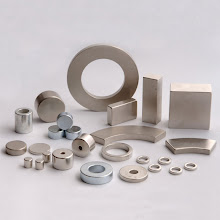Study on the Fabricating Techniques and Effective Anisotropy and Coercivity of Nanocomposite Permanent Magnet
Study on the Fabricating Techniques and Effective Anisotropy and Coercivity of Nanocomposite Permanent Magnet
Permanent magnet is a kind of magnetic material which can transform electromagnetic energy to mechanical energy. Because of the magnetic energy conversion function and various physical effects of permanent magnet, it has became the central functional devices in the fields of computer, network, household appliances, communication, traffic, spaceflight et al. Nanocomposite permanent magnetic material is a new kind of rare earth permanent magnet, which is composed of soft phase and hard phase with nanoscale microstructure, it is expected to be a new generation of permanent magnets.
Currently, the experimental value of the energy product in nanocomposite magnetic materials is far below the theoretical value,this is mainly due to the severe decrease of the coercivity despite the obvious increase of the remanence. Therefore, the energy product of http://www.999magnet.com/ material is limited. How to improve the coercivity and remanence at the same time is the key problem to obtain a high energy product in nanocomposite. In this thesis, we investigated the magnetic properties in nanocomposite permanent magnetic material from both theoretical and experimental aspects. The main contents and results are as following:
1. We designed a laser crystallization device and nanocomposite of Nd3.7Pr3.4Dy0.9Fe86B5Nb1 was prepared using pulse laser crystallization method(PLCM).The optimum magnetic properties of Hcj=6.6 kOe,Br=1.23T,Mr/Ms=0.78,and(BH)max=18.5 MGOe are achieved by expose the amorphous ribbon to the laser beam for 1 min with the pulse frequency of 15Hz and laser energy of 700mJ.The experimental results show that the PLCM has some advantages over the traditional annealing method such as low energy consumption and high efficiency. The annealing time and energy can be precisely controlled during the PLCM process.
2.Taking Nd2Fe14B/α-Fe nanocomposite as an example, considering different contact situation of the grains, the effects of grain size on effective anisotropy and coercivity of soft phase, hard phase and nanocomposite have been investigated. The calculation results show that the exchange-coupling interaction increases the effective anisotropy and coercivity of softgrains and decreases that of hard grains. The effective anisotropy and coercivity in nanocomposite decrease smoothly with decreasing grain size when the grain size is larger than 20nm while they decrease dramatically with further decreasing of the grain size. In order to maintain high coercivity in nanocomposite permanent magnetic material, the ideal grain size should be around 20nm.
标签: Permanent magnet


0 条评论:
发表评论
订阅 博文评论 [Atom]
<< 主页